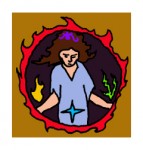 Everybody involved in the industrial production of mediopoly goods (movies, music, books, news) has been wondering what the new model will be for transactions in the age of the Internet.
Everybody involved in the industrial production of mediopoly goods (movies, music, books, news) has been wondering what the new model will be for transactions in the age of the Internet.
There isn’t one. There isn’t going to be one.
There has to be one, right? How else will people get paid? Silly Rabbit, the ownership doesn’t care about that. The people who do the work—authors, rock stars, journalists, cameramen—they can all eat cake.
What about the executives and the shareholders and…and…you know, the patricians who have a little bit of ownership?
Nope, sorry ol’ chap. Not just professionals, freelancers, and working stiffs.
Yes, even the companies themselves are going to lose capacity. The movie industry, the publishing industry, the newspapers, all of it is going to shrivel up and break into little cubes. Taking any patricians invested in them down into the black gulf of unprofitability and layoffs with dramatic gnashing of teeth for the commentators.
The reason is simple: The world is going broke and nobody has as much money as they used to.
Rich people too—they’re holding onto their profits for dear life, not giving an inch—but the other 99% of the world didn’t have much to begin with and that’s all been tapped out.
All that’s left to take the hit are standards of living.
As they begin to drop all around the more developed countries, the industries that depended on income from the surplus of leisure spending workers had, well they shrink too. The CEOs of these industries are surprised because they thought they were part of the club. But hey guv’nor, it’s just business. Sorry to hear your son won’t be going to a top school anymore.
All the models that have been proposed so far—paywalls, pay as you go, subscription, kickstarters—they’re all dead ends. People got no money, dude! At best all you’re doing is finding efficiency techniques to redistribute whats left of a declining wage class with fewer dollars to spare.
The Internet is built around a distribution model, not an exchange model. Transactions that slow down the flow lose energy and crash out of the psychological lane of traffic.
Into this setup comes cheap entertainment from the Internet—and it’s all going to be free, all of it—mass produced and easy to make in more variations than you can consume. All you pay is your monthly Internet fee and that’s it.
Oh wait, that’s already here.
Pirates are just a bogeyman, something propped up there for people to blame like communism. The stockholders have to be told something, right?
The mediopoly companies will shift the rising cost of copyright enforcement and surveillance on the providers through the government. Mainly because they’re losing money and can’t afford to keep suing everyone. Yes, even they’re crowdsourcing the old fashioned way—on the public’s bruised back.
How long can they keep that up before they can’t afford the political favors anymore? How much can the government enforce when there’s less tax base to support the enforcement? It’s a turtle race to the bottom.
The providers can raise the prices, but again people are getting poorer and the variety of content naturally overwhelms big business content. If I can’t afford the latest HBO special I’ll just buy the craphound version off Netflix.
That’s another thing. There is no quality and there never was. There’s only your crap and my quality. You can argue that 3D Casablanca is better than Lord of the G Strings, but at the end of the day people will consume what they can afford. Fidelity loses to convenience when you can’t buy a Betamax.
People don’t want a good story. They want a story they believe is good.
That makes connection the only game to play in this environment. Some folks sense this and focus their attention on “reaching the fans” as if this was the new model itself.
Services like Pandora come close to databasing connectivity, but we’re still a long way off from any kind of prototype with which to make a media database standard. A Manhattan style Wikipedia project is probably what’s required.
Until that happens we’re stuck with “the hunt”. Friends as clue finders. I don’t care if I can get it all, I care about if I can get what’s mine.
That’s why services like Spotify don’t work as well as YouTube or Amazon’s recommendations. Tell me what part of the forest to look and I’ll get it myself. If the interface isn’t brute simple you have slowdown and again, you drop out of the psychological lane of traffic.
Even if connection is achieved though, it’ll end up being an efficiency advance. Something to mask the declining revenue pool a little longer.
The industrial age has reached its peak and is starting to decline. This confuses people because they’re used to things trending up, not down.
The owners of the world are extracting more from a smaller and smaller money pool through efficiency and productivity gains. Getting the gold is the goal, even if the river is drying up. The winners just make less.
It’s like that old Lexx episode, “Feeding Pattern.” The house still always wins, but full winnings are now half winnings and half winnings are now quarter winnings. Only in this case there’s no spaceship to take the owners to a new planet to start again.
What industry servants and their patrician managers refuse to accept is that the cost has been shifted. The slush pile has been moved to the public and crowdsourced.
Less pay doesn’t mean the death of publishing, it means more craphounds.
The craphounds see the gates to the river are now open to the public and think their chance to strike it rich has finally come. Then they see what’s left of the river.
The owners are abandoning the mediopoly factories and manipulating the remaining consumers into covering the upfront costs. Rust of media factories and their personnel is the natural outcome. Why invest in new infrastructure when the returns are going down?
Some industry folks think the problem is too many craphounds. No, that was always the cost of doing business.
The problem is that profits are shrinking. There need to be more craphounds to increase the declining pool of wizards that may still exist to be exploited before the enterprise enters the steep end of the decline curve.
You find your biggest wizards in the beginning. Then you plateau. Then you enter decline. This is how life works, folks.
So what’s going to happen?
Well the whole thing looks like a craphound mega-farm to me. This long tail mega-farm is too big for fiefdoms to control and still make a profit. What you need is probably something along the lines of Borg control nodes. That means a larger number of smaller, mid-list way-stations to provide structure and channel libido projections.
There will probably be one or two corporate overlords that remain, only in diminished form; everything else gets divided up into drones and drone units (seven of nine). The overlords will vacu-jack up the most popular and monetizable eruptions of public interest, extract the Gelfling essence. But these will become quarterly or yearly events.
Much as going to the movie theater is now.
The Internet cooperative has formed itself into a way to farm out labor most efficiently to the public leisure spending that still exists. It’s a development that serves the reactive ownership in masking something more significant.
What does crowdsourcing the gatekeepers mean for servants in the mediopoly industry?
I predict extended periods of pressure to work twice as hard with half as much. Professionals will find themselves separated from their skills and positions as an identity. They’ll be expected to adopt a jack-of-all-trades model of independent contracting so they can fit into whatever flavor of the month project their patrician managers want them in.
As individual value is minimized, prestige and bargaining power will be reduced. Wages will shrink. In short, you’ll be a crew chief at Winky Dinky Dog, but it’ll be for less pay!
The patricians themselves will be forced increasingly into a hatchet man role as the owners come down on them hard to “cut costs” and “do things differently”. That’s Secret Langauge Noble for getting rid of servants and turning the treadmill dial up on those who still have jobs.
All standard plays from the ownership dream manual. The usual efforts to summon the psycho goals of free labor, automation of specialists, and value decoded by algorithm.
In short, the ideal vampire world. Fully socialized blood for the members of the Dracula Club! Anything less than 100% domination is a humiliating failure, so if the blood pool shrinks then the difference comes out of your neck first.
Meanwhile, the craphound mega-farm grows a freelance economy of atomization, domination, and zero dignity all hand delivered like a pizza. It’s diabolically brilliant.
There is no next incarnation of distribution that enforces paid transaction. This is it folks. Hold your arm out and let Renfield insert the vacu-jack.
Not just movies, books, comics, newspapers, music and magazines, but even sports will be affected. This is the decline of the second capitol, of the conglomeration of culture. It’s simple economics.
Just wait until prices start to rise on computers again. That’s when things get really interesting.
 I’ve been sitting on the dumper with this one for a while. Now that the TV series has effectively broken the book series out of the echo chamber and into the mainstream, I figured now is a good time to examine what’s going on with this story.
I’ve been sitting on the dumper with this one for a while. Now that the TV series has effectively broken the book series out of the echo chamber and into the mainstream, I figured now is a good time to examine what’s going on with this story.







